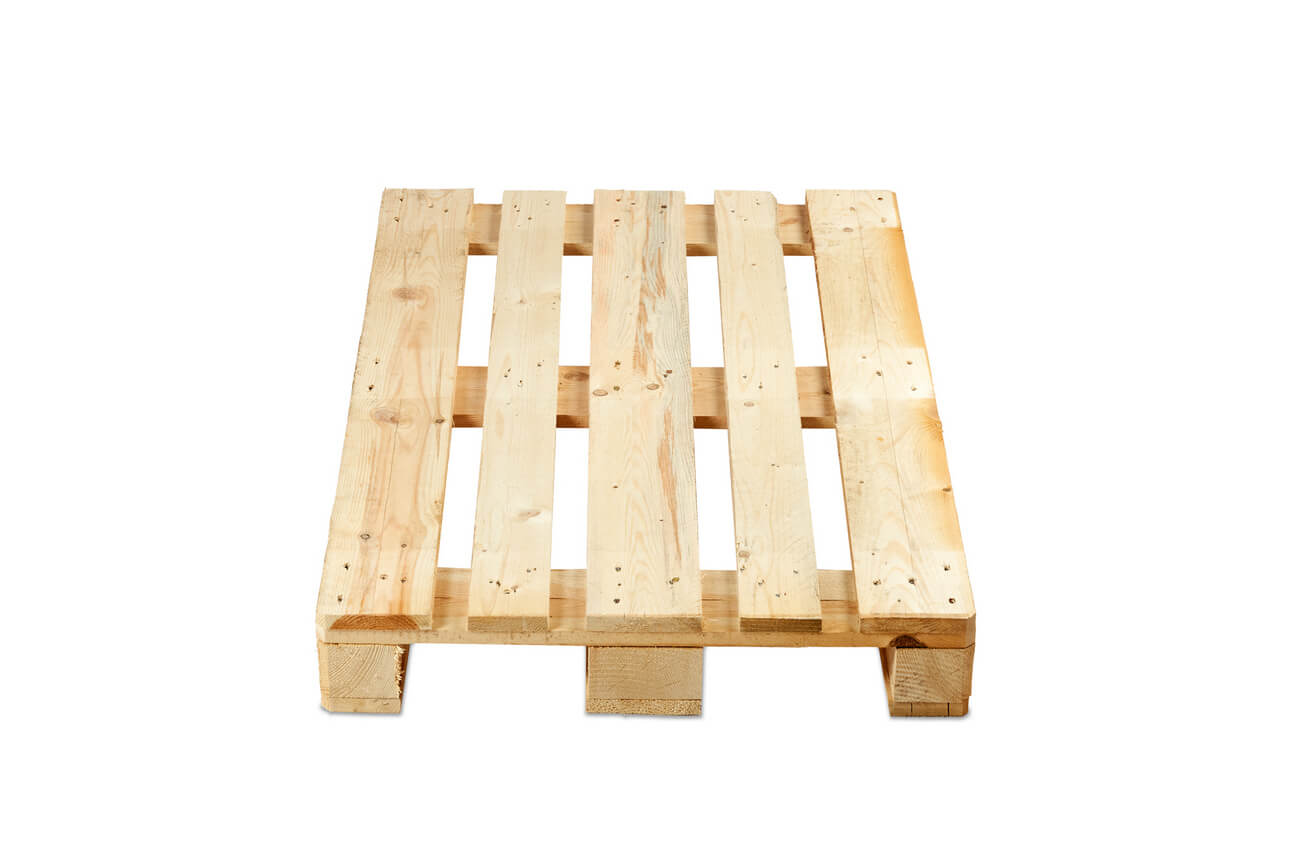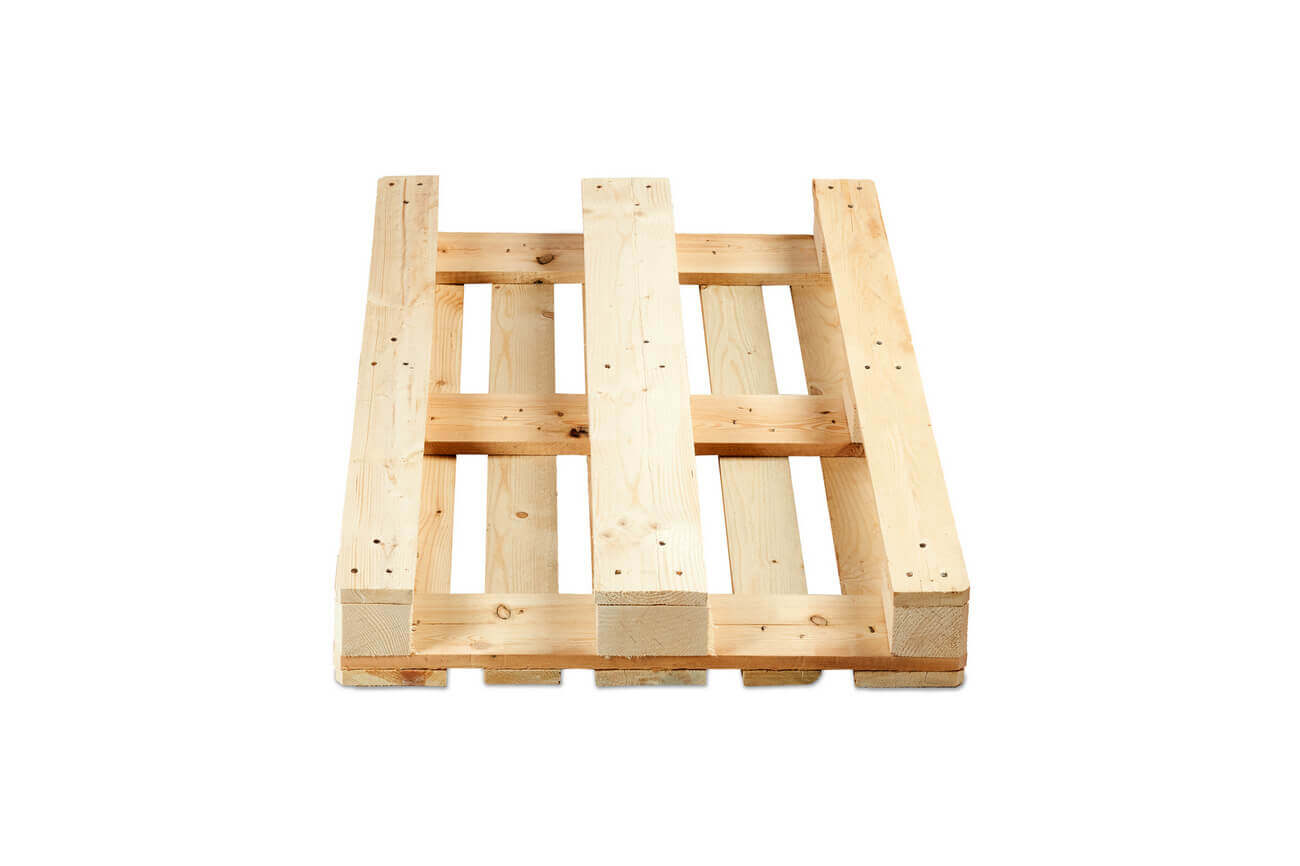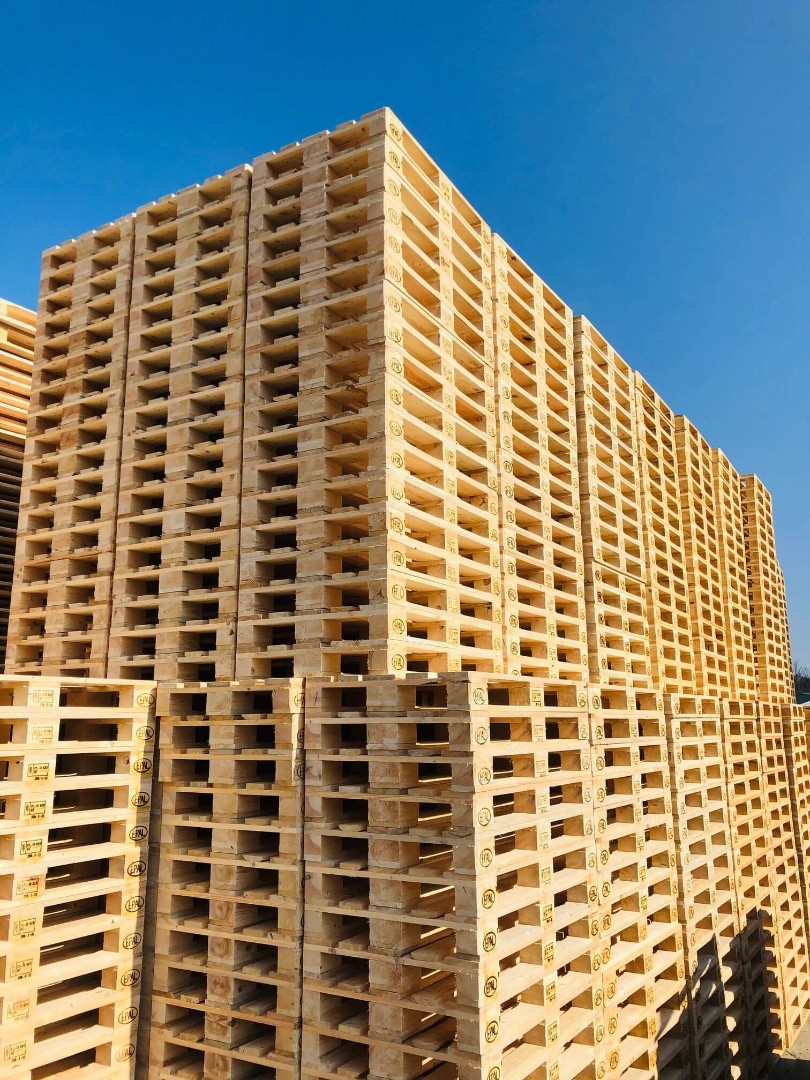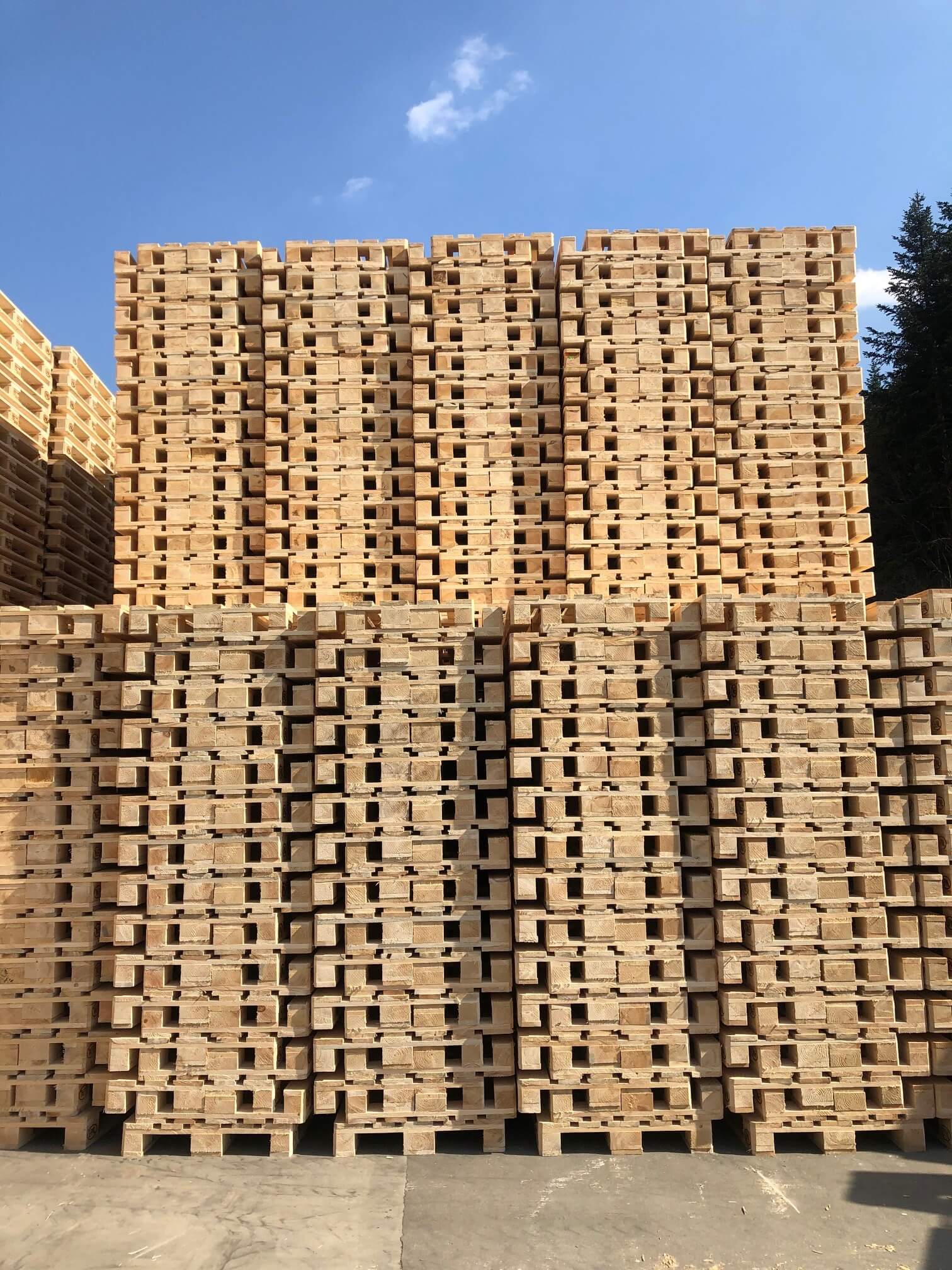
We are a certified EPAL pallets producer. We have been making them for many years. The pallets we manufacture are made out of top quality wood. As we also produce pallet elements, we have complete control over the raw materials which go into pallet production as well as the processes involved in their manufacture. Professional experience, modern production and drying technologies, control over the entire manufacturing process are just some of the factors which contribute to the top quality of our pallets.
Our range of EPAL pallets includes:
- EUR – EPAL 1 – 1200 x 800
- EUR – EPAL 2 – 1200 x 1000
- EUR – EPAL 3 – 1000 x 1200
- EUR – EPAL no markings

Pallets which comply with EURO and EPAL standards were coined in order to standardise pallet dimensions and uses. That process was instigated by railways and it is still continuing to this day. One of the methods to ensure pallets satisfy those standards and are of good quality is to limit their production. Pallets stamped with these standards can only be made at production facilities which hold appropriate certificates. Thus, bodies which ensure EURO and EPAL standards are met have full control over who producers and repairs pallets of this type.
The EURO and EPAL standards are extremely stringent. Practically every aspect of production is defined therein. Starting with what wood should be used for making such pallets, through the number of boards and blocks all the way to the number and layout of nails used to construct a EURO pallet. Although these restrictions are somewhat troublesome for producers, they do wonders for customer satisfaction. It is no other than those restrictions which mean that every EURO or EPAL pallet you purchase will be of the same, high quality.
Ensuring EURO and EPAL pallets dimensions is extremely important during the production process. All dimensions which these pallets come in are specified by appropriate standards. For wooden pallets there are also different pallet grades.
History of EPAL and EURO pallets

There is no doubt that the invention and popularization of pallets was a kind of revolution in the world of transport. However, how were they created and popularised? Transport pallets were the precursor of modern pallets. These were first used in ancient Egypt and Mesopotamia. Wooden and metal slabs were in common use at the start of the 20th century. These were used to store and transport goods and other items. Creating pallets was not a natural step in the development of transport and logistics. In a way it was another invention that caused it. In 1906, Pennsylvanian railways began using the world's first electric fork lift truck. It had little in common with the fork lift truck we know today. Nonetheless it was still a breakthrough moment in the logistics and transport industry. The truck showed that a vehicle powered by a small motor and not by muscles can not only operate but also find use in the industry.

There is no doubt that the invention and popularization of pallets was a kind of revolution in the world of transport. However, how were they created and popularised? Transport pallets were the precursor of modern pallets. These were first used in ancient Egypt and Mesopotamia. Wooden and metal slabs were in common use at the start of the 20th century. These were used to store and transport goods and other items. Creating pallets was not a natural step in the development of transport and logistics. In a way it was another invention that caused it. In 1906, Pennsylvanian railways began using the world's first electric fork lift truck. It had little in common with the fork lift truck we know today. Nonetheless it was still a breakthrough moment in the logistics and transport industry. The truck showed that a vehicle powered by a small motor and not by muscles can not only operate but also find use in the industry.

EURO and EPAL pallets – use
EPAL and EURO pallets are used by a truly vast number of different types of enterprises and businesses. Currently they are sued as the primary tool for storing goods and other items across Europe. This is one of the reasons why they are so popular in the international transport industry. They make it possible not only to store goods in a simple and convenient way, but also to safeguard goods before and during transport. Items stacked on the EURO pallet can be easily and quickly secured with lashings, stretch or heat shrink film. The ability to secure goods placed on a EURO pallet is all the more important as it gives businesses the confidence that their orders and shipments will arrive in full working order and undamaged.
EURO pallets are also commonly used in the food industry. They are approved as transport equipment for carrying food. They are suitable for all kinds of fruit, vegetables and other foodstuffs. EPAL pallets are also often used by the pharmaceutical industry to store and transport its products.
However, most pallets are used in all kinds of warehouses. Warehouses brimming with products stacked on pallets are a common sight.
Primary advantages of EURO and EPAL pallets
Currently EURO and EPAL pallets are the most popular way to store and warehouse goods. And that is attributable to the numerous qualities which EURO pallets possess.
Universal
EURO and EPAL pallets are widely used in virtually every industry. From the food industry, through pharmaceuticals all the way to heavy industry. Pallets are used in nearly every branch of industry. In addition, EURO and EPAL pallets have become so widespread that they are now the standard used throughout Europe and most countries of the world.
Easy to transport
EURO and EPAL pallets were created with convenience of transport in mind. It is therefore no wonder that they are ideally suited for use by every possible means of transport, from railways through lorries to air transport.
Durable
Relevant authorities ensure that all EURO pallets are produced according to the best possible designs and meet all the standards imposed on them. This means EURO and EPAL pallets can be used for many years to come. The pallets lifetimes are significantly improved by the possibility of repairing them. The pallets are very strong with load bearings between 1000 and 1500 kg. However, placed on a hard, stable surface they can often stand up to additional leads, even up to 4000 kg.
All those have contributed to the success enjoyed by EURO and EPAL pallets since they were invented. One may say that it is due to the hard work of many people who have spent a lot of time working on all the required standards and requirements that these pallets had to meet. On account of such stringent requirements, EURO and EPAL pallets have no equals anywhere in the world.
EURO pallet production process
1
EURO and EPAL production process is a relatively simple one. However, it is still worth getting acquainted with it if we want to be able to decide about which pallets to purchase and from whom. As a manufacturer of EURO and EPAL pallets, we are perfectly familiar with the entire production process. It all starts with the selection of the wood to be used for the pallets. As a manufacturer of EURO and EPAL pallets, we make sure that all the harvested wood comes from FSC certified forests. This means that all the wood we use to produce our pallets comes from sustainably managed forests. Our pallet production leaves no negative impact on the environment.
2
The harvested wood is then stored and sorted. For this purpose we have sorting machines which facilitate further production process.
3
Then we begin sawing roundwood into pallet elements. For this purpose, we have two production lines that allow us to process round wood to our preferred form. This allows us to produce high quality elements, in a strictly controlled manner.
4
Finished EURO EPAL pallet elements are then stored and transported in turn to subsequent production stages.
5
At our facility EPAL pallets are made on two production lines. The pallet production process itself is relatively simple, but requires the right conditions to produce a pallet that meets relevant quality requirements.
6
The last pallet production stage is drying the pallets until they are sufficiently dry and then storing them in a way that protects them from the elements until the finished pallets are sent to the customer.
The EURO and EPAL pallet standards
A feature that sets EURO and EPAL pallets apart from other unlicensed pallets is the number of restrictions and standards that they must meet. The European Pallet Association is the primary control body. That organisation assigns an EPAL symbol to pallets. It was established in 1991. Since then, the association has been focusing on developing and protecting the world's largest open production system for loading cargo. And the cargo units in question are none other than pallets. The European Pallet Association grants licences for the production and repair of EPAL pallets to selected manufacturers and workshops. All enterprises which have obtained such a licence are subject to regular inspections. In order to ensure the highest quality, these checks are not carried out by the association, but by independent quality control companies. The European Pallet Association also deals with market development and communication with pallet and cargo unit manufacturers. These actions aim to improve and promote the market.
The European Pallet Association also ensures that individual pallets meet the technical requirements. And these are as follows:
EPAL 1 pallet specification:
- 11 boards
- 78 nails
- 9 blocks
- Length – 800 mm
- Width – 1200 mm
- Height – approx. 144 mm
- Weight – approx. 25 kg
- Safe working load – 1500 kg
- Maximum additional load – 4000 kg
EPAL 2 pallet specification:
- 17 boards
- 133 nails
- 9 blocks
- Length – 1200 mm
- Width – 1000 mm
- Height – 162 mm
- Weight – approx. 35 kg
- Safe working load – 1250 kg
- Maximum additional load – 4250 kg
EPAL 3 pallet specification:
- 13 boards
- 84 nails
- 9 blocks
- Length – 1000 mm
- Width – 1200 mm
- Height – 144 mm
- Weight – approx. 30 kg
- Safe working load – 1500 kg
- Maximum additional load – 4500 kg
EPAL 6 pallet specification:
- 13 boards
- 69 nails
- 9 blocks
- Length – 800 mm
- Width – 600 mm
- Height – 144 mm
- Weight – approx. 9.5 kg
- Safe working load – 500 kg
- Maximum additional load – 2000 kg – on hard and level surface











